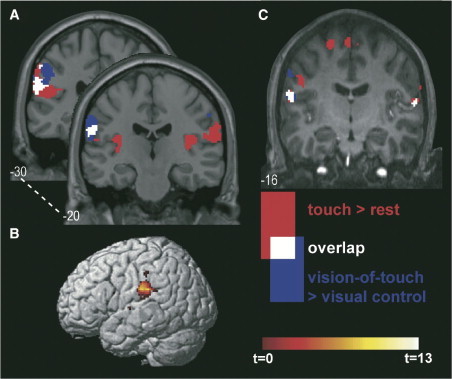
This is the second in our S4 Insights series: Proving the Soft Stuff with Hard Science.
When it comes to improving the customer experience or growing your B2B relationships, it can really pay off to know how someone else is feeling because you’ve walked in their shoes.
We see companies investing more and more into customer-centric initiatives but improving the customer experience less and less. That’s because no amount of market research or segmentation will help you connect with people if you fail to empathize – if you aren’t walking in your customers’ shoes.
Neuroscientists used to think it was just the visual cortex that would activate when we witness something happening to someone else, but empathy in the brain is far more complex. We now know that witnessing another person’s pain, feelings, or actions activates the same neural networks functionally responsible for experiencing those feelings or executing those actions firsthand. 1, 2
So, when you cringe at the sight of a team member being harshly or unfairly criticized in a meeting, the areas of your brain responsible for that cringe may overlap significantly with the areas that would activate if you were being criticized yourself. You call on your past experiences to elicit feelings of empathy.
But what if you’ve never been criticized in a meeting like your colleague? Would you have the same reaction? Would you still be able to empathize?

Figure 1: Brain activity when being touched (red) and witnessing someone being touched (blue).2 Notice the significant amount of overlap (white) between the two, evidence that witnessing another person’s pain or feelings activates the same neural networks responsible for experiencing those feelings firsthand.
Research suggests that you’d simply recruit neural circuits from a similar experience in order to relate, perhaps that time last quarter when you forgot to bring the handouts to an important team meeting. It’s a similarly embarrassing experience, but not exactly the same.
While empathy may seem like one of the softest skills you could practice in business, you should consider it the heartbeat of your business relationships. In fact, empathy involves a complex network of distributed neural regions that can include deeper parts of the brain, like the amygdala.3 The deepest parts of our brain are responsible for some of our most important biological functions, such as breathing and heart rate.
When it comes to improving the customer experience or growing your B2B relationships, however, it can really pay off to know how someone else is feeling because you’ve walked in their shoes.
That’s where we come in.
For over 30 years, clients have been coming to S4 when they need unique solutions to complex, business problems in order to grow B2B relationships. Our research and experience have shown us that the ability to empathize with your customers or business partners is fundamental to this growth.
Hence, the second key to powerful business relationships: learn by walking in another’s shoes.
Walking in another’s shoes in a business-to-business context helps you understand how your actions and decisions may impact others and lays the groundwork for reciprocity that makes it possible for everyone to succeed. Being able to empathize makes you easier to work with, helps you anticipate problems, and allows you to identify the best way of working with people inside and outside of your organization.
Take TradeRev, for example. Created by used car dealers for used car dealers, TradeRev is a revolutionary vehicle appraisal and auctioning system that facilitates real-time dealer-to-dealer vehicle auctions on smartphones, tablets, and desktop computers. By walking in the shoes of the buyers and sellers that come together on their online platform to bid, TradeRev saves time and resources by anticipating potential problems and tailoring problem-solving approaches.
In fact, the company is so dedicated to its customers that it partnered with CarsArrive Network, North America’s leading provider of automated vehicle-shipping services, to help automotive dealerships who lost their inventory during Hurricane Harvey last year. They gave Houston area dealers free delivery through CarsArrive Network on any vehicle purchased from TradeRev in Texas, Oklahoma and Florida, taking some of the financial pressure off Houston car dealerships and allowing them to rebuild. 4
The same empathy that led TradeRev to help their B2B customers in a time of crisis helped them become a revolutionary vehicle appraisal and auctioning company.
So, empathy isn’t just a key to powerful business relationships, it’s a vital sign that exposes the true strength of your business relationships by reflecting how often you walk in your customers’ shoes.
While our increasingly competitive business world often rewards independence and self-sufficiency, do not hesitate to learn by walking in another’s shoes. Empathy is paramount to creating healthy business relationships in which we feel connected, understood, and valued. It could be the one thing holding you back from higher levels of productivity, profit and a customer-centric culture.
By Trevor Thomas
Read more in this series at S4 Insight: Proving the Soft Stuff with Hard Science.
- Armstrong, K. (2017). ‘I Feel Your Pain’: The Neuroscience of Empathy. APS Observer, 31(1).
- Keysers, C., Wicker, B., Gazzola, V., Anton, J. L., Fogassi, L., & Gallese, V. (2004). A touching sight: SII/PV activation during the observation and experience of touch. Neuron, 42(2), 335-346.
- Decety, J. (2010). The neurodevelopment of empathy in humans. Developmental neuroscience, 32(4), 257-267.
- KAR Auction Services. (2017, October 17). TradeRev Extends Help to Texas Auto Dealers Still Recovering from Hurricane Harvey Impact. Retrieved from karauctionservices.com/traderev-extends-help-to-texas-auto-dealers-still-recovering-from-hurricane-harvey-impact/






